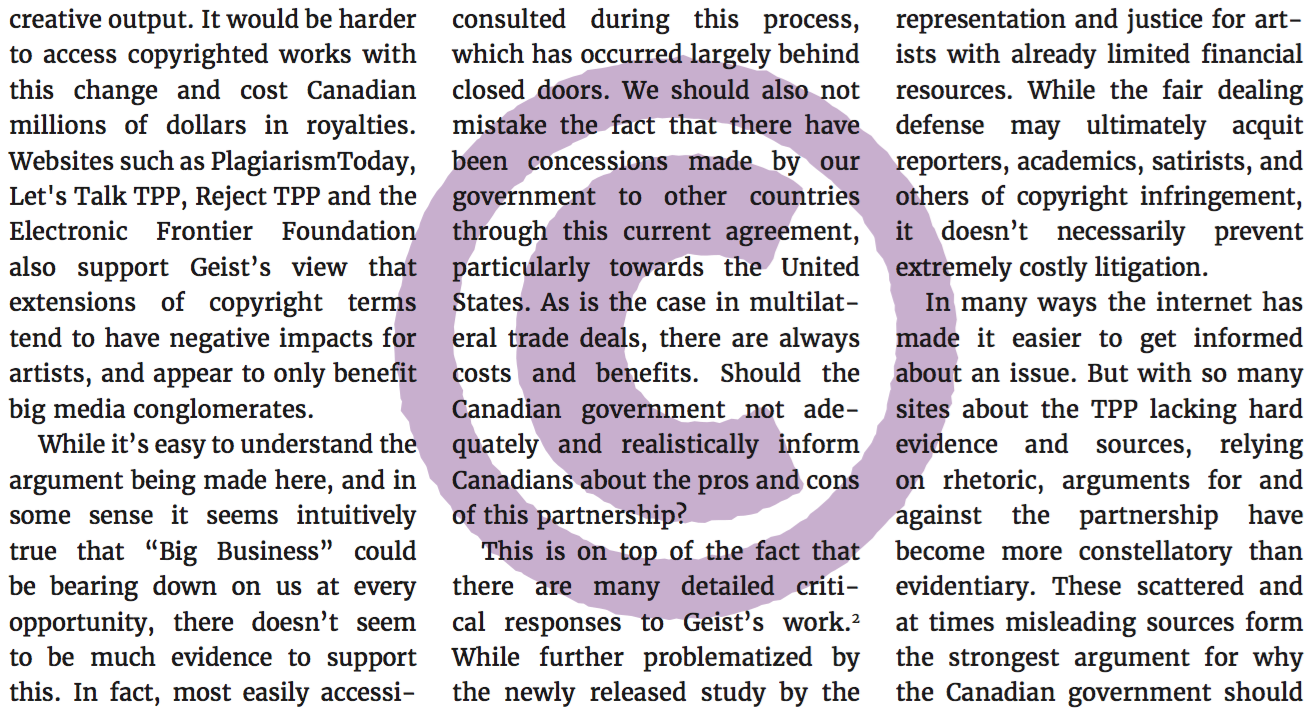On February 4, 2016, Canada officials signed into the Trans-Pacific Partnership (TPP), the largest multilateral trade deal in world history, encompassing the majority of the Pacific Rim. The Trudeau government promised Canadians that Canada was a long way from ratifying it, however. Before negotiations are complete, the government has opened their inboxes to Canadian citizens to sound-off opinions about the TPP. The deadline to submit feedback is fast approaching: 23:59 EDT October 31, 2016. If you’re a musician, like myself, or any other creative, be it filmmaker, writer, journalist, etc., there are a number of sections in the TPP that could affect you.
While the TPP will have a huge number of repercussion across all aspects of the economy, the provisions that will likely affect artists and consumers of art will include the extension of copyright terms to the author’s life plus 70 years; digital locks and technological protection measures (TPMs) that control access to copyright-protected works; and the allowance of foreign corporations to take legal action against Canada for laws that may conflict with the TPP agreements.

So you may be asking yourself, “What do I think about the TPP?” To answer this question you may first confidently turn to the actual text of the TPP document, then, realizing it weighs in at approximately 6,000 pages, quickly lose morale and turn to the internet for a summary of the TPP. You will find that there is a strikingly small amount of research done on how the TPP will specifically affect cultural industry, as research tends to focus on the aggregates. It’s somehow unsurprising that seemingly nobody at the bargaining table has asked, “But what about the artists!?” Even the executive summaries laid out on the Government of Canada’s website are thin, and largely biased towards selling Canadians on the current TPP deal.
Opinions are split among policy experts, economists and public interest groups, and finding a decisive answer on the internet soon becomes a war of attrition, with continuously diverging opinions ceaselessly adding points to either side of the score board. Do you give up your job as a diligent, informed citizen and pick a side in the absence of definitive judgment, hoping that you chose correctly? Or do you continue the endless cyber search, hoping for that one article that resonates like “checkmate” across the board?
Neither situation is ideal, but that’s not to say that ignorance is our only option. Contradicting sources are sources nonetheless.
In a survey of anti-TPP arguments, sources tend to converge upon Michael Geist, leading academic and Canada research chair in Internet and E-Commerce law. Geist has been running an online blog covering the TPP since 2011, ever since early draft sections of the agreement were disseminated through Julian Assange’s whistleblowing WikiLeaks. Geist has a number of apparently informed articles on his website, but has also summarized his views with regards to copyright extension in his published study, “The trouble with TPP’s copyright rules.”
Canada’s copyright laws currently last the life of the author or creator plus 50 years. In ratifying the current TPP agreement, Canada would extend its copyright up to 70 years past the author’s death, and would put Canada at the same standard as the United States and the European Union. According to Geist, extending copyright in Canada will keep many important works out of the public domain with no increase in creative output. It would be harder to access copyrighted works with this change and cost Canadian millions of dollars in royalties. Websites such as PlagiarismToday, Let’s Talk TPP, Reject TPP and the Electronic Frontier Foundation also support Geist’s view that extensions of copyright terms tend to have negative impacts for artists, and appear to only benefit big media conglomerates.
While it’s easy to understand the argument being made here, and in some sense it seems intuitively true that “Big Business” could be bearing down on us at every opportunity, there doesn’t seem to be much evidence to support this. In fact, most easily accessible articles against the current TPP copyright provisions don’t appear to include hard evidence or sources to support their conclusions, and what evidence is given may be misleading —
Attempting to confirm Geist’s arguments on his Work Cited page of sources for copyright extension, I discovered only three citations that led to academic studies, while the rest lead to poorly substantiated blogs and news articles. Citation (6) actually contradicts Geist’s argument, and (13)’s abstract explicitly claims to be incomplete. Citation (8) leads to a New Zealand study for which no argument has been given showing its relevance to Canada, coming under strong criticism from another economist, George Barker. Not to mention, the inclusion of several academic studies that support increased copyright laws.1
Regardless of its relevance, it is commendable that New Zealand has attempted to study copyright extension with regards to the TPP. As of the publication of this particular article, the Canadian government has yet to produce anything of the sort for Canadians, especially for artists. Creatives need to know what they could stand to gain and lose from the TPP, but the Canadian government has not been transparent with this information. Indeed, transparency has been a major issue since it was announced that Canada was joining the negotiations on October 9, 2012; Canadians have not been consulted during this process, which has occurred largely behind closed doors. We should also not mistake the fact that there have been concessions made by our government to other countries through this current agreement, particularly towards the United States. As is the case in multilateral trade deals, there are always costs and benefits. Should the Canadian government not adequately and realistically inform Canadians about the pros and cons of this partnership?
This is on top of the fact that there are many detailed critical responses to Geist’s work.2 While further problematized by the newly released study by the Canadian Government indicating an overall $4.3 billion projected boost to the economy, even that study has little to say about the impact the TPP would have on artists working in Canada, and the conditions around the international distributions of their works. The absence of academic studies in Geist’s articles is not necessarily negligence, but rather an unfortunate result of inadequate source material in general. Bibliographical gaffs don’t preclude accuracy on Geist’s part, but they do make it harder to discern truth. When it comes to the TPP, Canadians are left at the mercy of speculations and educated guesses.
There is essentially a strong disagreement between academics and interest groups on what exactly the TPP would entail, let alone whether or not it would positively impact Canadians in all industries. If anything can be gleaned from this article and others circulating the internet, it’s that there is a strong sense of uncertainty about what the TPP will mean for creatives, and Canadians on a broader scale.
It’s well known that vagueness in law benefits lawyers, and the people that can afford to hire them. With corporations litigiously bearing down on creative property while artists scramble to defend themselves with “fair dealing,”— a legal exception to a creator’s exclusive right to copy a work — it’s easy to predict that issues will arise around access to representation and justice for artists with already limited financial resources. While the fair dealing defence may ultimately acquit reporters, academics, satirists, and others of copyright infringement, it doesn’t necessarily prevent extremely costly litigation.
In many ways the internet has made it easier to get informed about an issue. But with so many sites about the TPP lacking hard evidence and sources, relying on rhetoric, arguments for and against the partnership have become more constellatory than evidentiary. These scattered and at times misleading sources form the strongest argument for why the Canadian government should show more leadership in providing solid and up-to-date facts about the TPP. What creatives, and Canadians in general need is greater transparency from the government explaining how the TPP will affect them, backed up by studies and hard evidence that cuts through the vast and unreliable ether of the worldwide web.
Artists should be concerned about the TPP, not necessarily because of what we know about it, but because of what we don’t know.
x
You may express your concerns by emailing TPP-PTP.consultations@international.gc.ca, or by finding your local MP at lop.parl.gc.ca.
x
1These sources were originally found through Barry Sookman’s article “TPP Copyright, e-commerce and digital policy: a reply to Michael Geist: See EU Commission, “Impact Assessment on the Legal and Economic Situation of Performers and Record Producers in the European Union”, SEC(2008) 2288; PwC Economics, “Impact of Copyright Extension for Sound Recordings in the UK” (28 April 2006); Richard A. Posner & William M. Landes, “Indefinitely Renewable Copyright “ ( John M. Olin Program in Law and Economics Working Paper No. 154, 2002); Prof. Barker, “Common Myths About the Economic Effect of Copyright Term Extensions for Sound Recordings”; Kamil Gérard Ahmed, “A Case for a Longer Term of Copyright in Canada – Implications of Eldred v Ashcroft Case” (2006) 37 R.D.U.S.
2A number sources are detailed at the beginning of this article and can also be found in the works cited section. barrysookman.com/2015/12/15/tpp-copyright-e-commerce-and-digital-policy-a-reply-to-michael-geist/


